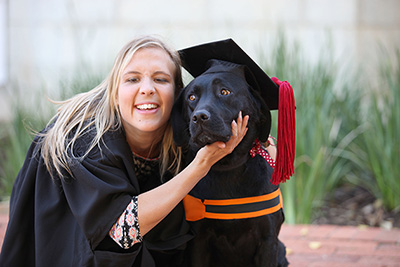 Louzanne Coetzee and her guide dog, Oakley after she received her degree at the UFS’s Autumn Graduation.
Photo: Gerhardus Bosch |
Videos
Prof Himla Soodyall
Mr Ndumiso Hadebe
Leanne Manas
Dr Maria Phalime
YouTube video
Photos
Photo Gallery
Autumn has seen the UFS’s first graduation ceremonies of the year on the Bloemfontein Campus. From 14 to 17 April 2015, a total of 3 660 graduates were rewarded for their hard work while top speakers addressed them in the Callie Human Centre.
UFS Chancellor, Dr Khotso Mokhele, commented the more than 250 students who passed their degrees with distinctions at the autumn graduation.
Prof Soodyall, a Medical Scientist at the South African Institute for Medical Research as well as Principal Medical Scientist for the National Health Laboratory Service, and Director for the Human Genome Diversity and Disease Research Unit at the University of Witwatersrand delivered the first motivational message of the April Graduation. The group of graduates in the Faculty of Natural and Agricultural Sciences listened as she shared her story with them.
"My own career – with no grand design or script – steered me into conducting genetic research on human populations from sub-Saharan Africa with a focus on a better understanding of human evolution, and to reconstruct the prehistory of African populations. While giving graduates a glimpse on how her career progressed, Prof Soodyall said: "I share these stories with you to give you some reassurance that you do not need feel that you have to figure out every minute detail of where to from here. Things fall into place with hard work, dedication, and dreams.
The developed world is forging ahead with interventions, so the gap between the developed world and the developing world continues to grow bigger. Prof Soodyall said: “You have the unenviable opportunity to think strategically, and to use the modern tools in your respective fields to make significant advances to transform our society, and to contribute to making it a better place for all. We need to embrace the current challenges, and build networks and bridges across disciplines to close the gaps, to work beyond the cultural barriers, and to ensure equity in access to health, water, education, etc, for all, as we would wish these things for ourselves and our families.
Read the full story of the Autumn Graduation 2015